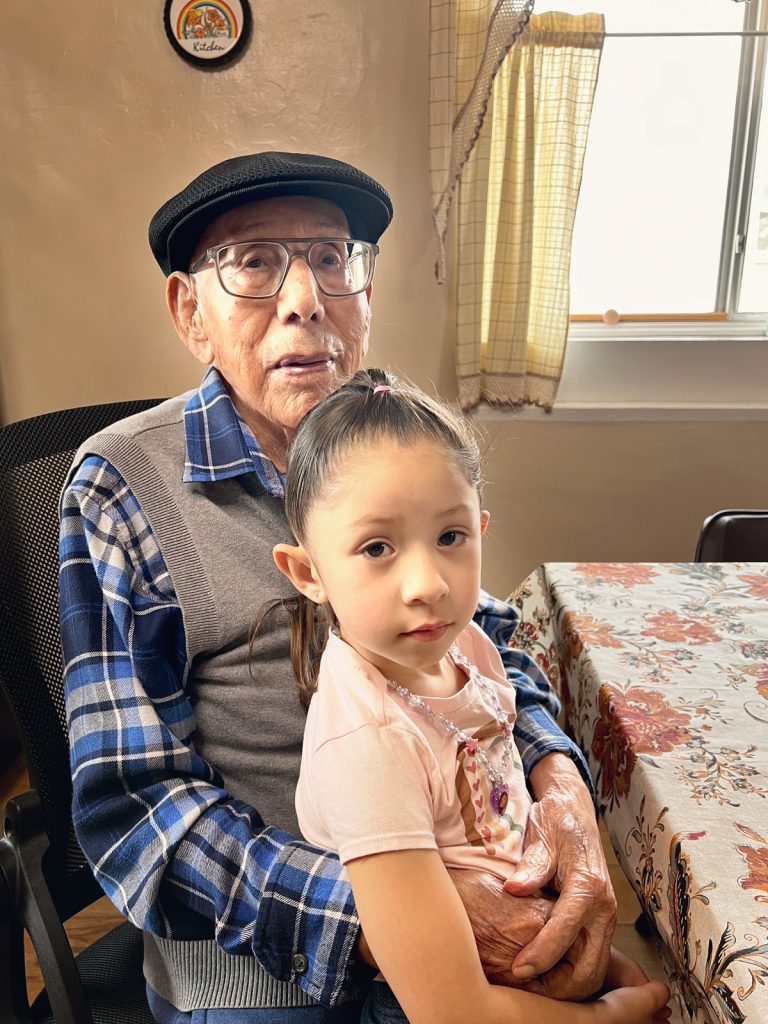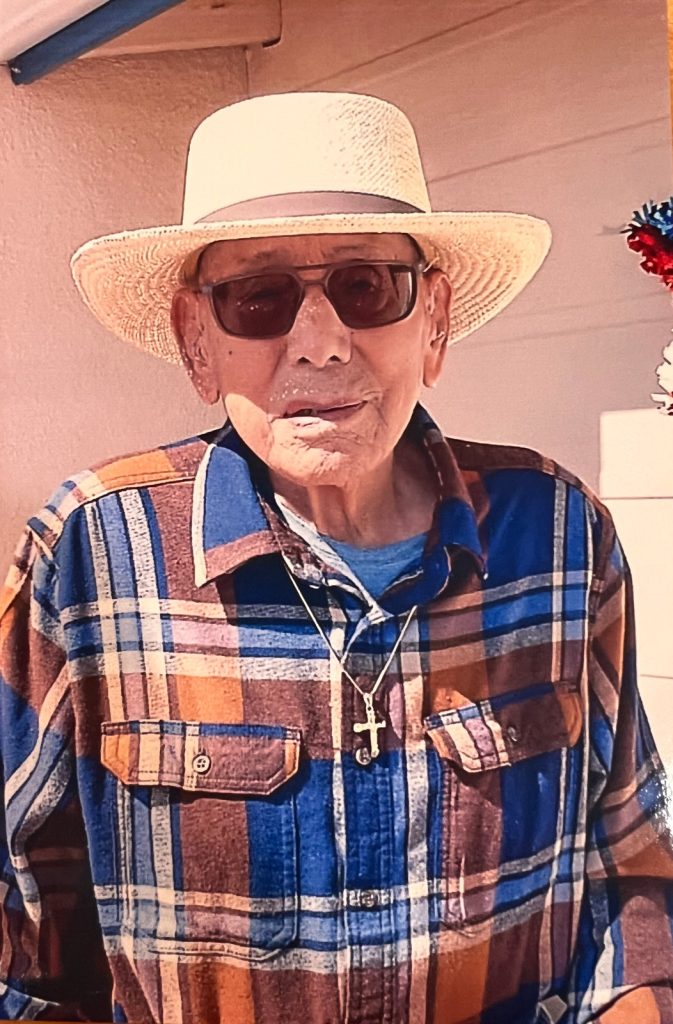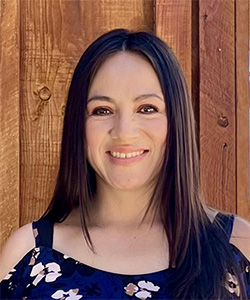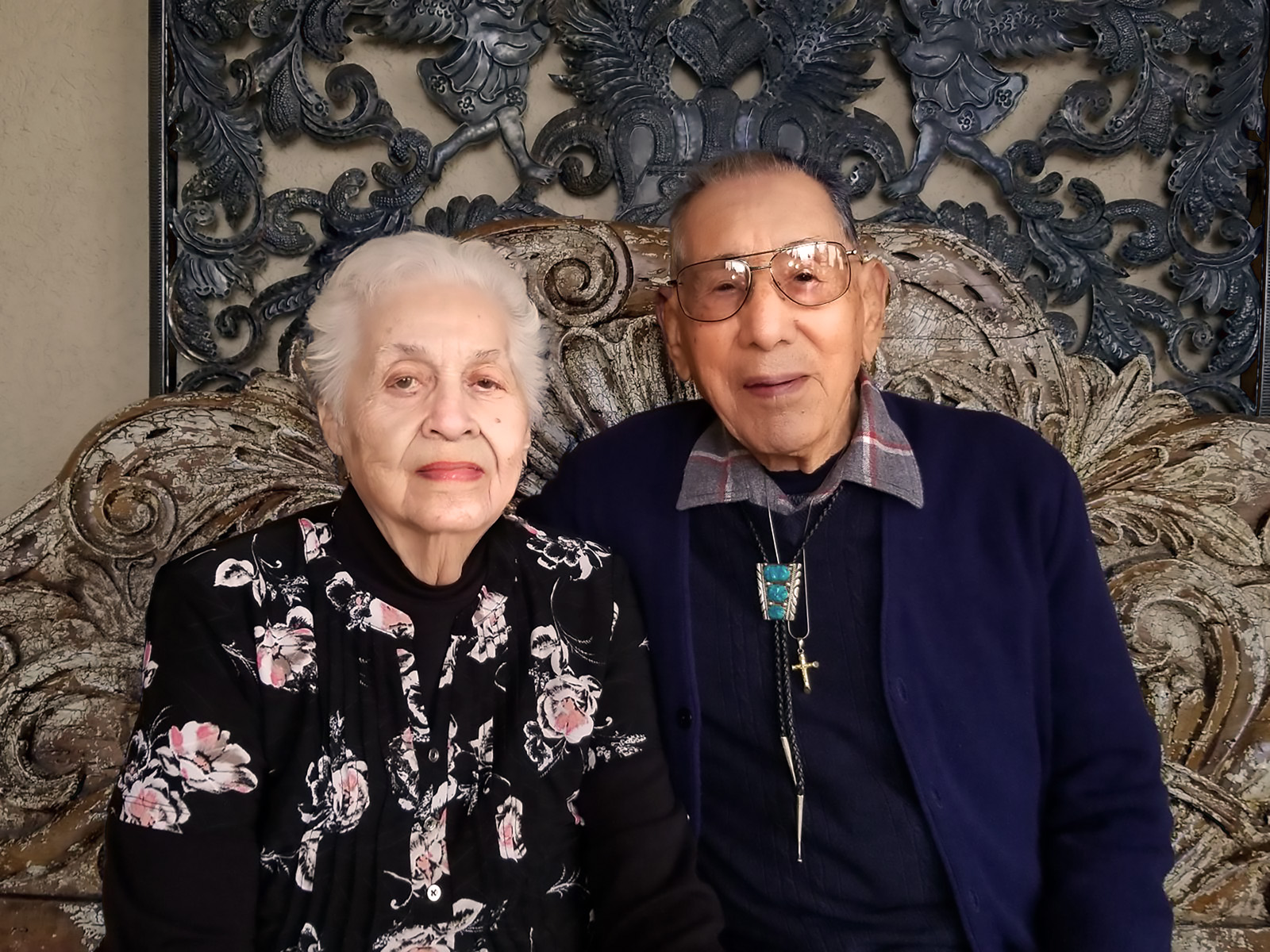

Valdemar DeHerrera turned 105 on October 8, 2024. He is a decorated war veteran and prisoner of war. He says there are two things that helped him get through his most difficult times; family and faith.
DeHerrera’s house, where he and his wife of 69 years, Consuelo, raised their children—six girls and one boy as well as two adopted children—sits on what used to be his 100-acre farm. All throughout his home are little reminders of his military service, but nothing is as prominent as the family pictures, particularly of his wife and kids. Large vintage pictures of his children hang proudly in the living room, and his chair faces in that direction.
Together, we sat with his daughter Valerie Rael, his granddaughter Celina Trujillo, and his great-granddaughter Janae Trujillo, shuffling through old photo albums containing black-and-white pictures and more current pictures of him with his wife on travels after he had retired.
DeHerrera was 22 years old when he was drafted into the Army and eventually transferred to the New Mexico National Guard. What was supposed to be an 18-month training in the Philippines turned into three years and seven months, spent as a prisoner of war after the bombing of Pearl Harbor. Upon returning to New Mexico, severely malnourished, DeHerrera spent months recuperating in Santa Fe.
DeHerrera recalls that when he returned to New Mexico, he met his wife, Consuelo DeVargas, in Taos. “She didn’t know how to cook or farm so I taught her both,” DeHerrera says. He and his wife created a homestead in Costilla and raised their family with the same values that DeHerrera grew up with. “My mom was strict but my dad was more relaxed,” DeHerrera says. He talked about his family being entrepreneurs when it came to establishing businesses in Costilla and Amalia. “They made a good life for themselves and were generous to many along the way,” said granddaughter Celina.
DeHerrera is very stylish and has a great sense of humor. He wore a plaid collared shirt with a sweater vest and under his flat cap his hair is actually turning black. “It’s going back to its original color again!” His daughter Valerie remarks while giggling, “he’s going in reverse!”
DeHerrera recalls the difficult times he spent in the Philippines and being constantly beaten, weak, and extremely malnourished. He believes that the hard work he put in as a child helped him get through some of his toughest times. He is fourth in line of a total of 14 children of his parents Meliton and Lupita DeHerrera. As a POW he recalled finding verdolagas and cooking and eating them while others looked at him like he was crazy, but due to his upbringing, he recognized certain plants and knew how to use the resources around him.
Valdemar’s faith played a major role in getting him through difficult times as a POW. He recalls three instances where his guardian angel helped him. There was a time when DeHerrera and a small group of men were hiding in a bunker when Japanese soldiers found them. There was one soldier who went straight for DeHerrera yelling and digging a gun deep into his chest, who seemed ready to pull the trigger. DeHerrera kept his composure, and in a moment’s notice another Japanese soldier would intervene on DeHerrera’s behalf.
DeHerrera was subject to several smaller marches and beatings along with his fellow soldiers where he would see many of his comrades killed. During one of these walks, DeHerrera became extremely weak and fell down. If you were found this way by a Japanese soldier, you would’ve surely been killed. He calls this moment his second encounter with his guardian angel. A fellow soldier showed up and carried DeHerrera until he regained his strength to walk again.
The third encounter with his guardian angel would be his time as a POW, working in a textile factory in Manchuria. While at work one day, DeHerrera was one of the prisoners chosen to take a beating.
Frustrated, DeHerrera stood up to the soldier, which led him face-to-face with a high-ranking official who would then decide his fate. Shockingly, that Japanese official showed him mercy and spared him his life.
His granddaughter Celina, who is a consistent visitor, recalls the times that DeHerrera said he shouldn’t have made it home, except for the intercession of his guardian angel who saved his life numerous times.
Despite the challenges DeHerrera experienced for years while overseas, he led a very successful life when he returned to New Mexico, after his recuperation. DeHerrera worked for the highway department for a few years and then began working at the Molycorp Mine as a general foreman, eventually retiring after 26 years.
The importance of family has surely passed down through the generations of his family. Currently, his daughters take care of him year-round and he gets visits from his family members which he truly enjoys. “He loves company and he loves visitors,” “He always tells visitors, ‘God bless you’ before they leave.” Celina says proudly.
As DeHerrera is over one century old, he has seen major changes throughout his life, but the one thing he says that has changed the most is the phone. He recalls the time when the phone only worked with a crank and that’s how you made a call. Now you can ask your phone anything. Celina giggles as she says, “My grandpa asks me to ask my phone questions all the time.”
After the passing of their mother Consuelo in 2019, Valerie is happy to spend her time with her dad, as she shares this responsibility with her sisters. She says she wouldn’t have it any other way. When Celina was asked what she tells grandchildren who have grandparents that are still alive, she said, “Visit with them, spend time with them, take time to hear their stories. We need to absorb all we can from this generation because they are so rich with information, lessons, and substance. What they have gone through, grown up in, and learned is truly something we need to value because one day we will need these things.”
Stories are important. This is how generations share information with each other. Celina tells about the times they’ve spent at the Bataan Memorial Death March in White Sands. “There used to be so many soldiers there… in recent years it’s only been Valdemar. Most of those men have passed on,” Celina says.
When DeHerrera was asked what has mattered most in his life, without hesitation he names his family. “He loves to go for cruises everywhere. Doesn’t matter where: he just loves to ride around,” says Celina with a smile.
Before I leave, I take a picture of him and his granddaughter, who are sharing a snack together. There is a 101-year difference between great-granddaughter Jenae and Valdemar. Thinking about that makes me pause and think to myself—what an incredible life. As I’m about to walk out the door he stops me and says, “God bless you.”
We thank Mr. DeHerrera and all veterans for their service and sacrifice.
Author
-

Experience working with the USDA Forest Service and extensive knowledge of the northern region, while maintaining and fostering strong community relationships remain a big priority.
View all posts


